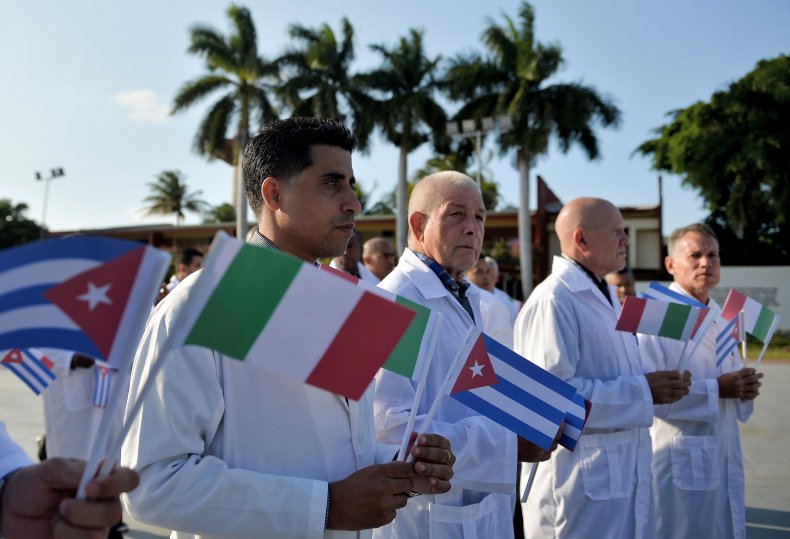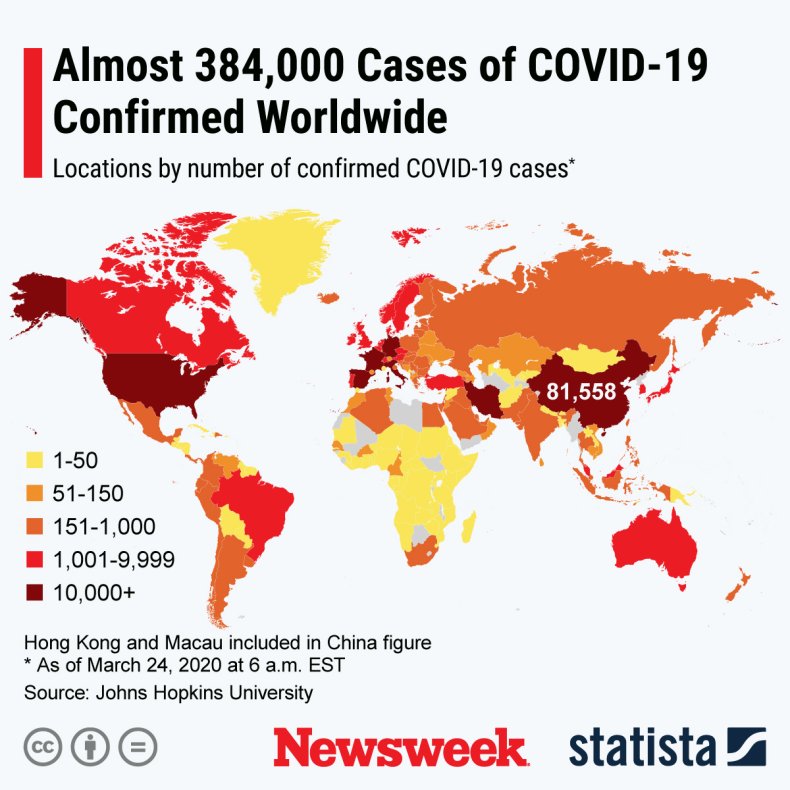As the world is reeling under the COVID19 pandemic and every country is looking for a coronavirus cure, Cuba bells the cat and starts distributing a wonder drug, says an article published in the Newsweek.
What is it?
Cuba has mobilized its medical corps around the world to distribute a new “wonder drug” that officials there say is capable of treating the new coronavirus despite the United States’ strict sanctions that continue to pressure the communist-run island.
The drug, called Interferon Alpha-2B Recombinant (IFNrec), is jointly developed by scientists from Cuba and China, where the coronavirus COVID-19 disease outbreak first emerged late last year.
Already active in China since January, the Cuban Medical Brigades began deploying to dozens of nations, providing personnel and products such as its new anti-viral drug to battle the disease that has exceeded 400,000 confirmed cases across the globe.
As of Tuesday, over 100,000 people have recovered from the infection and more than 18,000 have died.
How useful is the drug?
Cuba first used advanced interferon techniques to treat dengue fever in the 1980s and later found success in using it to combat HIV, human papillomavirus, Hepatitis B, Hepatitis C and other diseases.
The use of Interferon Alpha-2B Recombinant “prevents aggravation and complications in patients reaching that stage that ultimately can result in death,”
The Wonder Drug
Cuban biotech expert Luis Herrera Martinez said, according to a recent Yale University Press Blog feature written by the University of Glasgow’s Helen Yaffe. She called the treatment a potential “wonder drug” against the new coronavirus.
Yaffe, who recently authored a book on Cuba’s post-Soviet economic experience entitled We Are Cuba!, told Newsweek that she knew of at least 15 countries that have contacted Cuba to request the drug, along with “local mayors and hospital directors who are anxious to get hold of the Cuban anti-viral to meet the crisis.” Interferon Alpha-2B Recombinant has not been approved to treat COVID-19, but has been proven effective against viruses similar to it.
- It has been selected along with 30 other drugs to treat COVID-19 by China’s National Health Commission.
- The World Health Organization will be studying interferon-beta, along with three other drugs, to determine their effectiveness against the new coronavirus.
Ban on the Drug
Cuba’s ambitious anti-pandemic efforts are hindered, however, by decades-long U.S. sanctions that one Cuban official described to Newsweek as “the main obstacle not only to respond to major health crises like COVID-19, but the main obstacle to the country’s development at any area.”
“The lifting of the blockade against Cuba would have an extraordinarily positive impact on Cuba and mostly in the health sector, which has been one of the most damaged areas since the establishment of the blockade almost 60 years ago with more than 3 billion in economic losses,” the official added.

Countries Can Be Saved
“Despite the blockade, Cuban doctors are working in 59 countries around the world, 37 of which have confirmed cases of COVID-19,” the Cuban official told Newsweek.
These countries include Latin American and Caribbean countries such as Grenada, Jamaica, Nicaragua, Suriname and Venezuela but also Italy, which has witnessed the deadliest COVID-19 outbreak to date. The disease has no veritable vaccine or cure yet, but Havana hoped to demonstrate its ability to at least alleviate health crises on an international scale.
Cuban COVID19 Situation
At home, Cuba’s experience with COVID-19 has been relatively mild. The country of roughly 11.5 million people has so far registered 40 cases and a single death as of Tuesday, according to the Cuban Ministry of Public Health.
The Cuban health sector is highly developed, a priority of Fidel Castro’s mid-20th century revolution that placed the island in the spotlight of Cold War geopolitics. “Health is an issue of utmost importance for Cuba, which is why we defend the right of all human beings to receive quality medical care,” the Cuban Foreign Ministry said in a statement sent to Newsweek. “Therefore, solidarity is a principle defended by Cuba and our people during more than 60 years of Revolution.”
Yaffe explained to Newsweek how “a small, Caribbean island, underdeveloped by centuries of colonialism and imperialism, and subject to punitive, extraterritorial sanctions by the United States for 60 years, have so much to offer the world.”
“After the Revolution of 1959, Cuba’s socialist state developed a free, universal healthcare system, attaining more doctors per person than any other country in the world. This has been facilitated by free, universal access to education at all levels,” she said. “The benefits are distributed globally; some 400,000 Cuban medical professionals have worked overseas in six decades, mainly in poor countries, providing healthcare that is free at the point of delivery.”
Before embarking abroad on what’s known officially as “collaboration missions,” 400 Cuban doctors and specialists are preparing for their missions by training at the Pedro Kouri National Institute of Tropical Medicine, according to the Cuban Foreign Ministry.
The Havana-based institute has been designated a health center for treating confirmed COVID-19 cases, though there were few so far at home.
“Now is the time to demand an end to sanctions that stop Cuba from getting access to the resources it needs to fight this deadly pandemic, both for their own population and for the global beneficiaries of Cuban medical internationalism.”

Did you subscribe to our daily newsletter?
It’s Free! Click here to Subscribe!
Source: News Week
















